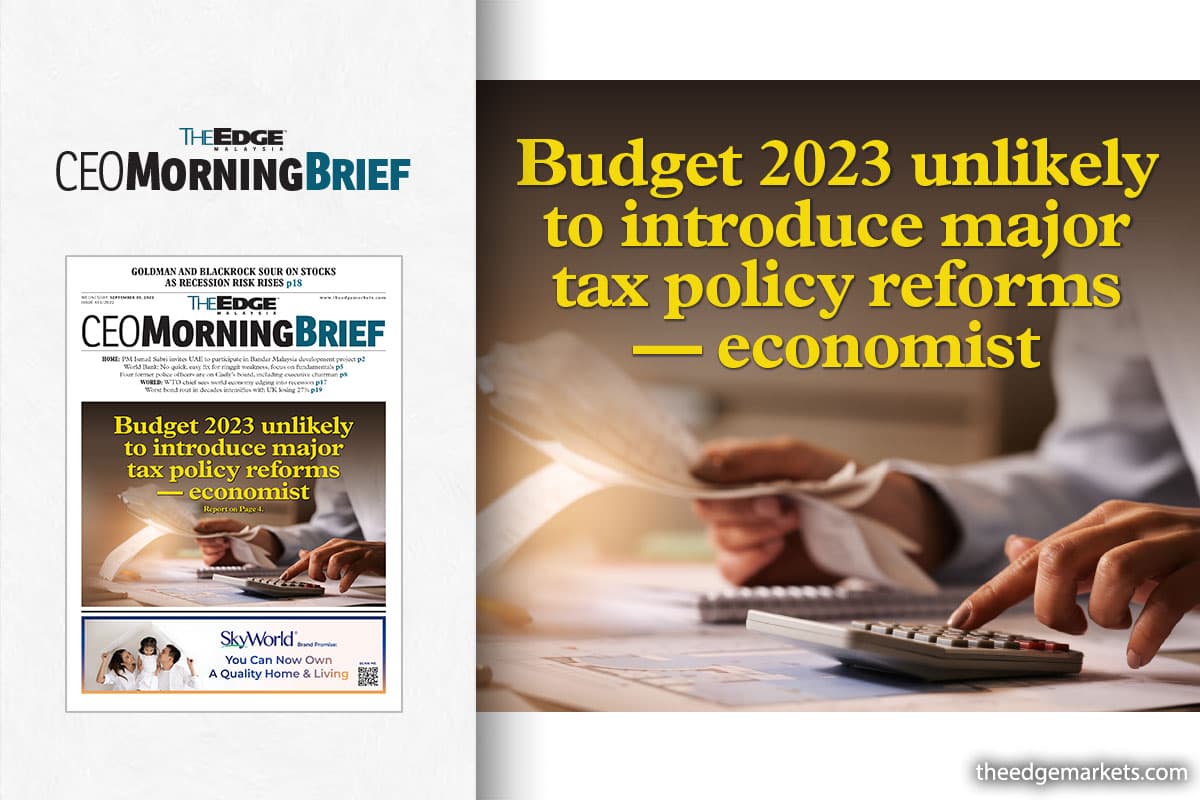
KUALA LUMPUR (Sept 27): The upcoming Budget 2023, to be tabled in Parliament next Friday (Oct 7), is unlikely to introduce major tax policy reforms in view of the need to manage inflation, according to economists.
“The government’s focus currently isn’t on fiscal consolidation or the medium-term fiscal framework,” said RHB Research chief economist Sailesh K Jha in a note on Tuesday (Sept 27).
“Tax reforms could be delayed further. In our view, major changes in corporate, personal income, and capital gains taxes are unlikely. Changes to capital gains tax for the property sector, as well as inheritance tax announcement is not expected by us as well,” he said.
Although the Goods and Services Tax (GST) is not expected to be re-introduced next year, Maybank Investment Bank Bhd (Maybank IB) foresees the government to begin conveying a message for the needs for such a broad-based tax, going forward in 2024.
“We do not expect GST to be re-implemented in 2023, in view of the need to manage inflation, following our expectation of the transition to ‘targeted’ from ‘blanket’ fuel subsidy — and thus some adjustments in fuel prices next year,” said Maybank IB in a note dated Sept 25.
“We do not rule out some ‘messaging’ in Budget 2023 to prep consumers and businesses on the need for — and hence the possible return of — GST in 2024, i.e. after the next general election,” it added.
A prolonged absence of GST would raise the prospect of taxation on wealth and capital gains in the future, adding to Budget 2022’s proposed reinstatement of taxation on foreign source income, which is now postponed until Dec 31, 2026, Maybank IB said.
Nonetheless, it said the government may announce in Budget 2023, Malaysia’s adoption the 15% global tax on multinational companies (MNCs) and with it, the potential introduction of a Qualified Domestic Minimum Top-Up Tax (QDMTT), where if an MNC’s profits in a jurisdiction are taxed below the global tax rate of 15%, a top-up tax will be imposed.
“There might be a specific Budget 2023 measure to address the ringgit situation, i.e. official directive for government linked companies (GLCs) and government-linked investment companies (GLICs) to repatriate overseas profits and investment income, and “go slow” on their overseas direct and portfolio investments,” it added.
RHB’s Sailesh opined that without new taxes, it is unlikely that Budget 2023 will have any significant market-moving policy announcements.
“The main policy focus will be cash transfers and other types of assistance to [the] lower- to middle-income households. These policy measures for the consumer could be partially financed by increased dividend payments from Petronas, in our view,” it said.
Lower deficit-to-GDP in 2023, but long-term consolidation a challenge
Maybank IB said Budget 2023 is likely to be “less expansionary” as the government may kickstart the medium-term fiscal consolidation that aims to bring down the budget deficit to 3.5% of GDP by 2025.
“With 2023 being the mid-point of the 12MP (12th Malaysia Plan) period, the medium-term fiscal consolidation process must therefore begin next year, to moderate the negative fiscal impulse by spreading the targeted budget deficit reduction over several years.
“Hence, Budget 2023 may target a deficit of 5.0% of GDP, down from 6.0% to 6.4% in 2020-2022,” it said. This mainly reflects two key factors on the expenditure side, it added.
“First is the expiry of [the] Covid-19 Fund that accounts for around one-third of budget deficits in 2020-2022. Second is the lower fuel subsidy, hence slower growth in operating expenditure,” it said.
Fuel subsidy may ease as the government moves from “blanket” to a more “targeted” approach, coupled with projection of lower average crude oil prices next year.
Meanwhile, RHB foresees the fiscal deficit to be at 5.0%-6.0% of GDP next year.
It has revised its 2022 target to 6.0%, from 6.3%, on the back of its 2022 GDP growth revision to 6.0%, from 5.3%, implying non-oil related revenue targets by the government are “on track”.
Sailesh added: “It would be quite challenging for the government to achieve the fiscal deficit target of 3.5% of GDP in 2025, as outlined under the 12th Malaysia Plan, without an intense fiscal consolidation plan which we think is unlikely in the near term, as Malaysia’s economy is in the midst of post pandemic recovery.”
To receive CEO Morning Brief please click here.